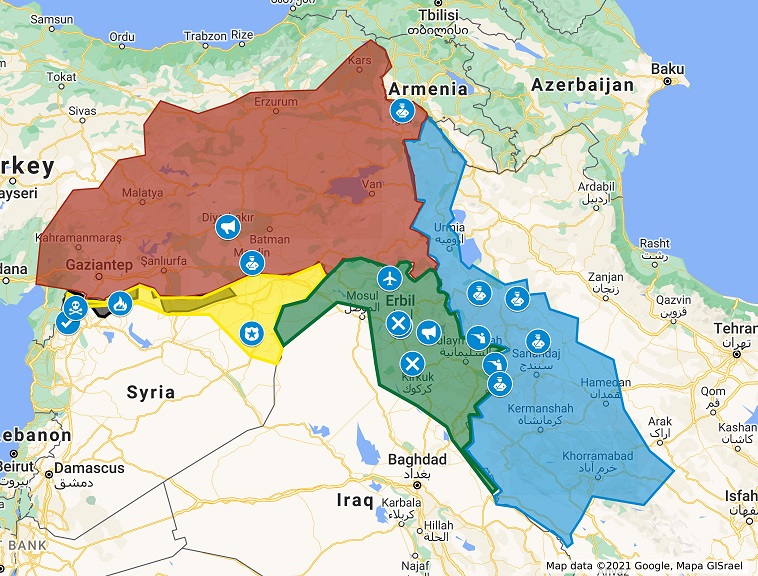1.3K
Iran
- On the 32nd anniversary of the assassination of Kurdish leader and former head of the Democratic Party of Iranian Kurdistan (KDPI), Abdul Rahman Ghassemlou, the Cooperation Center for Iranian Kurdistan’s Political Parties (CCIKP) called for the international community, mainly European nations “in negotiations with Iran,” to revive the murder case against Gassamlou’s killers. The CCIKP went on to describe the election of Ebrahim Raisi as “a serious message of continuation of repression and terror.” Ghassemlou and two other Kurds were assassinated by Iranian agents in Vienna on July 13, 1989.
- Iranian authorities arrested several Kurdish activists, including Ahmed Sadiqi in Divandarreh, Farshed Nazhad in Baneh, and Omed Walizadeh in Shahin Dej. Several local human rights organizations claimed all of those detained were arrested without a warrant.
- Iranian border guards killed a Kurdish border porter (Kolbar) named Hamad Aminpiur near Baneh and another named Abdulaziz Hajipour near Urmia. Iranian border guards also wounded three Kolbars near Baneh and another named Ashraf Qadirnia near Marivan. Moreover, the Kurdistan Association for Human Rights (KMMK) reported Iranian authorities tortured dozens of Kolbars after arresting them and confiscating their cargo near Nowsud.
- Mahabad’s public prosecutor ordered the arrest of the owner of a newly-opened women’s store and five models employed by the store for failing to “respect the dress codes prescribed by Islamic customs, traditions, and laws.” The store is now closed, and the owner and the models are awaiting trial.
Iraq
- Turkish warplanes and drones struck several locations in Iraqi Kurdistan, including a mountainous area near Dohuk Governorate’s Sheladiz subdistrict and a Christian village in the governorate’s Chamnke subdistrict. Meanwhile, the Kurdistan Region Parliament’s Special Committee for Affected Bordering Areas presented its report on Turkey’s ongoing incursion into Iraqi Kurdistan to Speaker of Parliament Rewaz Fayeq. The report blamed the Kurdistan Workers’ Party (PKK) for maintaining a presence in the region that gives Turkey a pretext for invasion yet also claimed Turkey’s military operations violated “international laws and norms.” Furthermore, the report blamed the Government of Iraq (GOI) for remaining silent and “ignoring” Turkey’s ongoing breach of Iraq’s sovereignty. Lastly, the report acknowledged Turkey’s incursion has destroyed hundreds of Kurdish villages, created a 15-40 km deep occupation zone in Iraqi Kurdistan, and resulted in the establishment of 70 military bases and observation posts so far.
- Iranian-backed militias’ July 6 attack on Erbil led to the postponement of Greek Prime Minister Kyriakos Mitsotakis’ planned visit to Iraqi Kurdistan. That said, though last week’s attack only caused minor property damage, Erbil International Airport remains a favored target of Iran’s proxies in their unremitting campaign against the US presence in Iraq.
- A number of non-Kirkuki Arabs attempted to occupy a Kurdish village near Kirkuk Governorate’s Sargaran subdistrict on July 7. While the Arabs had a memorandum signed by Kirkuk’s acting governor, Rakan Saed al Jabouri, that permitted their occupation of the village, Kurdish villagers prevented the takeover. Granted, numerous local issues remain unresolved and the Arabization policies restarted in the “Disputed Territories” on October 16, 2017, remain in effect.
Syria
- Turkish-backed Islamists shelled northern Manbij again on Friday and caused no reported casualties. The Syrian Democratic Forces (SDF)-affiliated Manbij Military Council claimed the attack targeted “al-Jat village” with “heavy and medium weapons.” Concurrently, several additional indirect fire attacks targeted Kurdish-controlled territories near Aleppo.
- The United Nations Security Council voted unanimously to keep the Bab al Hawa crossing on the Turkish-Syrian border open for another six months. However, the US and its allies failed to convince Russia to approve the opening of other crossings, which ensured Bab al Hawa remains the only entry point for humanitarian aid outside of the Assad regime’s control. Amnesty International criticized the decision and called it a “compromise resolution that falls short of humanitarian needs.”
- The Kurdish-supported Afrin Human Rights Organization reported 35 Kurds have been killed in Turkish-occupied Afrin in 2021 and noted the building of at least 100 settlements for non-Kurds in areas controlled by Turkey and its proxies. Simultaneously, the UK-based Syrian Observatory for Human Rights (SOHR) reported Turkish proxies are still perpetrating kidnappings for ransom, extorting local residents, and looting or destroying local resources.
- The SDF’s Anti-Terror Units (YAT) announced the capture of three ISIS (Da’esh) terrorists in Deir Ez Zor Governorate’s as Shahaddi. Despite the YAT’s recent success, however, Da’esh remains a threat in the governorate partly due to the Assad regime and its Russian allies’ failure to contain it in Syria’s al Badiya region, where dozens of Syrian Arab Army personnel and Assad regime-allied militiamen have been killed during the last three months.
Turkey
- On July 7, the European Parliament decisively passed a resolution condemning the Turkish government’s closure case against the pro-Kurdish Peoples’ Democratic Party (HDP) with a vote of 603 in favor, two against, and 67 abstentions. The resolution also denounced the removal and replacement of elected Kurdish mayors and dozens of other anti-democratic measures instituted by the Turkish government.
- Turkish President Recep Tayyip Erdogan visited the nation’s largest Kurdish province, Diyarbakir (Amed), amid an escort of thousands of police tasked with stifling any protests or dissent. Erdogan went on to hold an indoor event attended by members of his own party, the Justice and Development Party (AKP), where he defended his crackdown on Kurdish politicians and accused the pro-Kurdish People’s Democratic Party (HDP) of having ties with Israel.
- A Turkish court in Mardin Province sentenced a previously removed Kurdish official from Midyat District, Filiz Işık, to six years and ten months in prison for “membership in a terrorist organization.” Furthermore, Turkish police raided a gathering commemorating the Suruç massacre in Istanbul and arrested 13 people, most of whom were relatives of the deceased. Finally, Turkish authorities arrested 32 members, including 30 in Igdir and two local officials in Urfa and Hakkari.

